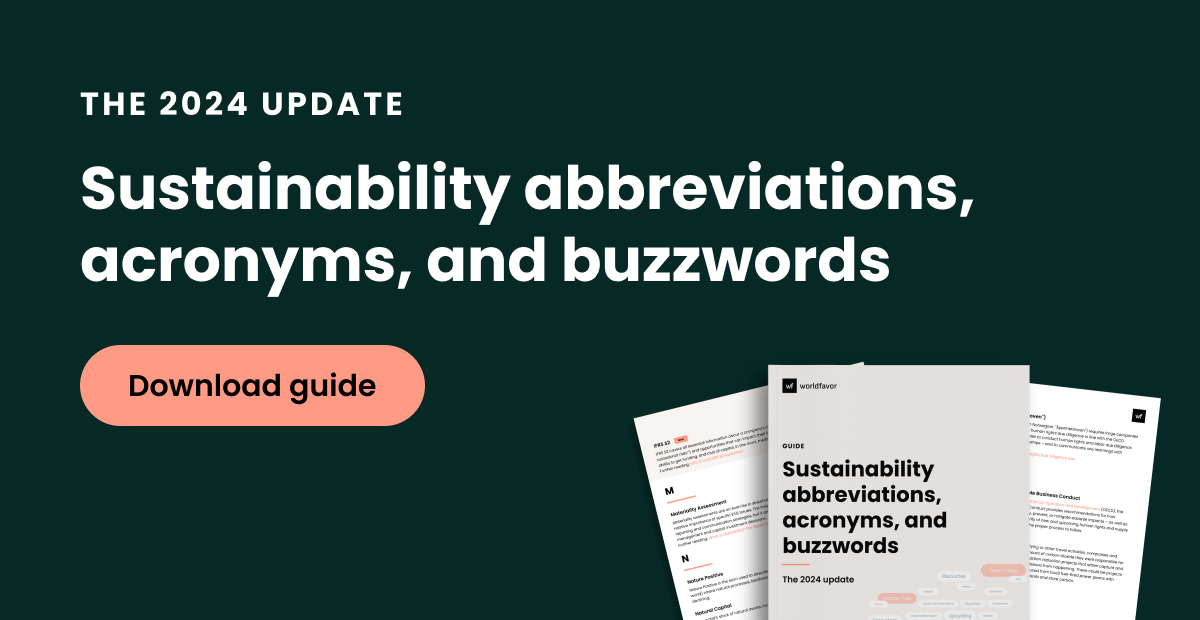The 2024 sustainability buzzwords
We are excited to announce the release of our 2024 edition of the Worldfavor Guide to Sustainability abbreviations, acronyms, and buzzwords! This comprehensive glossary is your go-to resource for all the trending terms and jargon in the sustainability sector.
Get your hands on the latest 2024 edition of the guide now:

Published: August 2024
In today's world, companies must prioritize their environmental and societal impact to remain relevant and thrive. As the language of sustainability evolves, so does the challenge of keeping up with the plethora of new terms, acronyms, and abbreviations.
To help with this we created the Guide to Sustainability Abbreviations, Acronyms, and Buzzwords. This essential resource is updated annually to include the latest terminology you'll encounter in the sustainability realm. We are excited to present the freshly updated 2024 edition!
Spoiler alert: Keep reading for a sneak peek at some of the newest additions to our glossary. Don’t forget to download the full copy here:
We've added...
Digital Product Passport (DPP)
A digital Product Passport is a tool aimed at enhancing transparency about a product’s environmental impact by offering relevant and comprehensive information about its lifecycle. Similar to traditional passports, each product has a unique identity that’s linked to one source with information about just that specific product.
EUDR
The EU Deforestation Regulation (EUDR) mandates companies to conduct due diligence to guarantee that their products, such as soy, beef, palm oil, wood, cocoa, coffee, and rubber, are sources without causing deforestation or forest degradation.
The EUDR is a part of the European Green Deal that entered into force June 29, 2023, and will come into full effect on December 30, 2024. It's expected to drive major changes in global sourcing and production practices, significantly reducing the EU's impact on deforestation and forest degradation worldwide.
Human rights due dilligence
Human rights due diligence (HRDD) is a risk management process that businesses can implement to identify and respond to actual and potential negative impacts within their own operations and their supply chain.
Responsible business conduct (RBC) legislations
Requires a company to implement specific procedures to reduce adverse impacts e.g., implement a human rights or/and environmental due diligence process, which aims at identifying, bringing to an end, preventing, mitigating and accounting for adverse human rights and environmental impacts in the company’s own operations, its subsidiaries and its supply/value chains.
IFRS S2
IFRS S2 covers all essential information about a company’s climate-related risks (both physical and transitional risks*) and opportunities that can impact their business, including aspects such as cash flows, ability to get funding, and cost of capital, in the short, medium, and long run.
Further reading: IFRS S1 and IFRS S2 explained
Sustainable sourcing
Sustainable sourcing is the practice of procuring products and materials in a way that considers environmental, social, and economic impacts. It aims to minimize negative effects on the environment and society while promoting ethical practices and long-term resource availability.
... and many more! If you want to impress your colleagues, business partners, and customers with your sustainability expertise – make sure to get your own copy of the guide to keep all the essential lingo close at hand at all times!





%20as%20the%20deadline%20approaches.%20Learn%20about%20compliance%20requirements%2c%20potential%20delays%2c%20and%20key%20updates..png)

